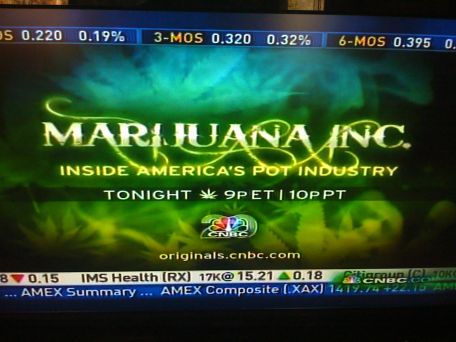Watching CNBC, I was about to get ticked about the incessant reporting over the Michael Phelps smoking dope story.
Who cares whether a 23-year-old kid partakes a little bit? You certainly can’t say pot has made him unmotivated or unhealthy, since he has enough gold in his Olympic swimming medals to gild Trump lobbies from here to 2019 (which is about when the next building will be built).
So I was pleasantly surprised to see CNBC had a business angle—corporate sponsor is keeping its deal with Phelps. And co-anchor Dennis Kneale made much the same points I did above after the report, also noting that tens of millions of Americans also smoke weed (transcripts courtesy of TVEyes):
Bravo, Visa. Thank you for being reasonable and not destroying the kid’s life over something that 40 million kids have done.
Then… dude! Co-anchor Michelle Caruso-Cabrera let it all hang out, calling for the legalization of marijuana—much to the obvious surprise of her co-anchors.
it should be legal, by the way, anyway.
Hey, good for her. Maybe she was promoing the CNBC special report “Marijuana Inc.: Inside America’s Pot Industry” that runs tonight at 9. The ad called it the “most watched documentary ever” on the network.

Meanwhile, Jerry Levin, the ex-CEO of Time Warner who sealed its disastrous merger with AOL, came on the air to talk about media stocks and blaming CEOs.
Funny, but the CNBC folks were much more sympathetic to the CEOs than Jerry Levin, who once was one. In fact, Levin started talking more like a Zen master than a titan of industry:
Of course it affects you. But the lessons are really remarkable and important. Part of the problem is when you’re in office, slowly but surely, you lose your sense of identity. By the way, all the perks that you have become addictive. Whether that’s the office, the entourage, the planes, you get isolated from yourself, from your family and who you really are. You forget that it’s transitory; that there is a next chapter. You put aside the important things like, why are you here? and what about your family?
Yes, when all that is taken away, you finally realize that a lot of the coverage — by the way, we’ve made celebrities out of CEOs. We take them up and take them down… it’s important for us to understand that that’s not the true identity of the person. You know, to be a CEO is actually an important assignment. But it’s only temporary.
One of the co-anchors asked Levin how John Thain and Dick Fuld must feel now, and he responded:
John Thain and Hank Paulson (i think he meant Dick Fuld), these are good people that become intoxicated with self worth. it develops into a power or hubris.
If man’s search for meaning is getting good airtime on CNBC, you know times are bad.
Ryan Chittum is a former Wall Street Journal reporter, and deputy editor of The Audit, CJR’s business section. If you see notable business journalism, give him a heads-up at rc2538@columbia.edu. Follow him on Twitter at @ryanchittum.
